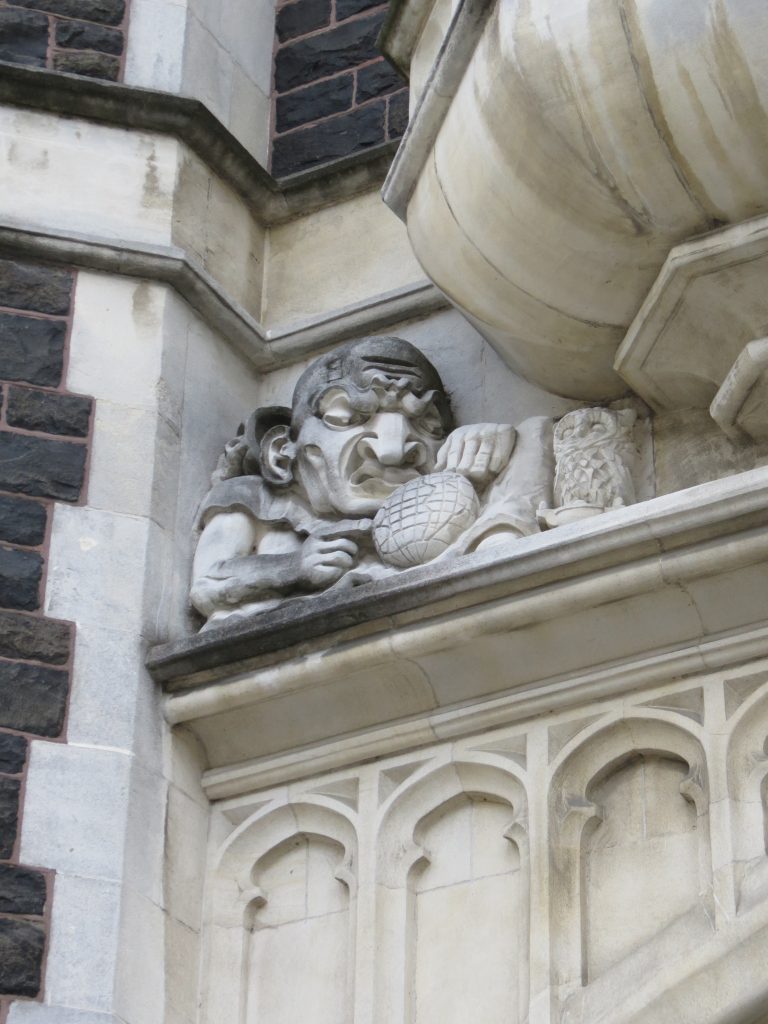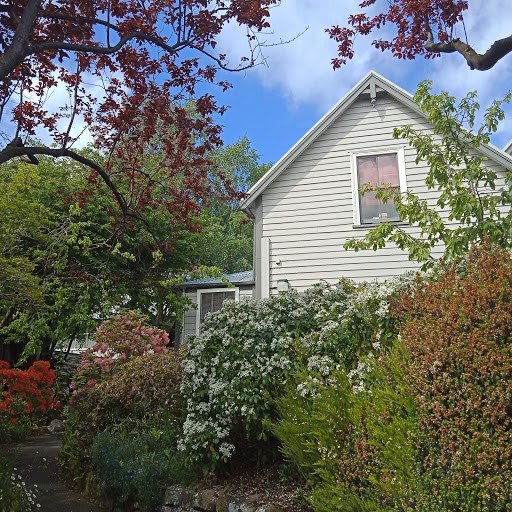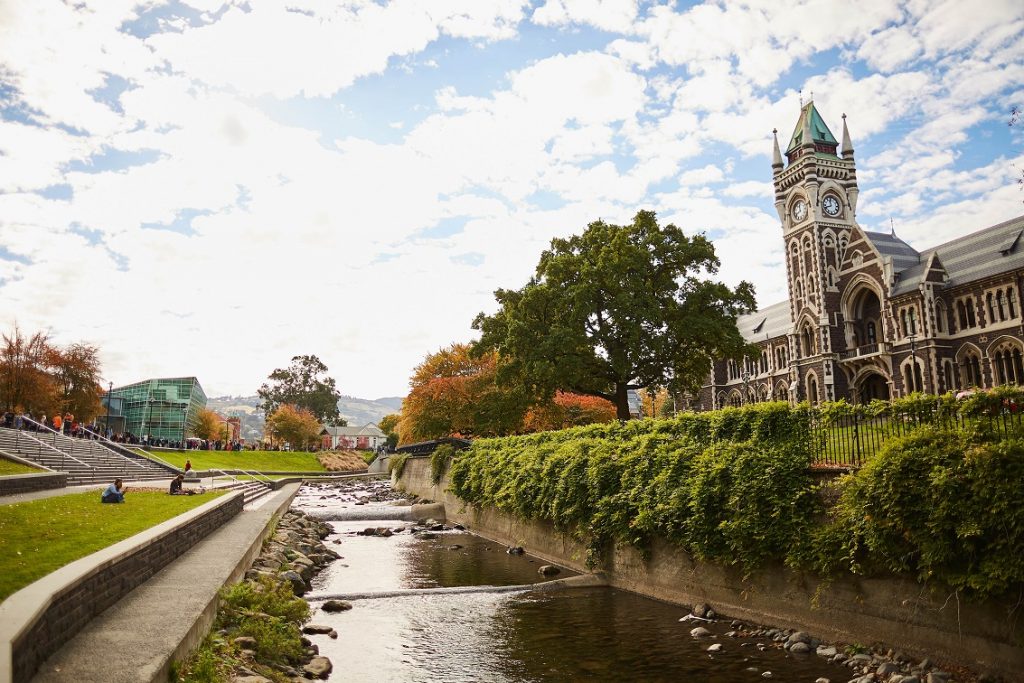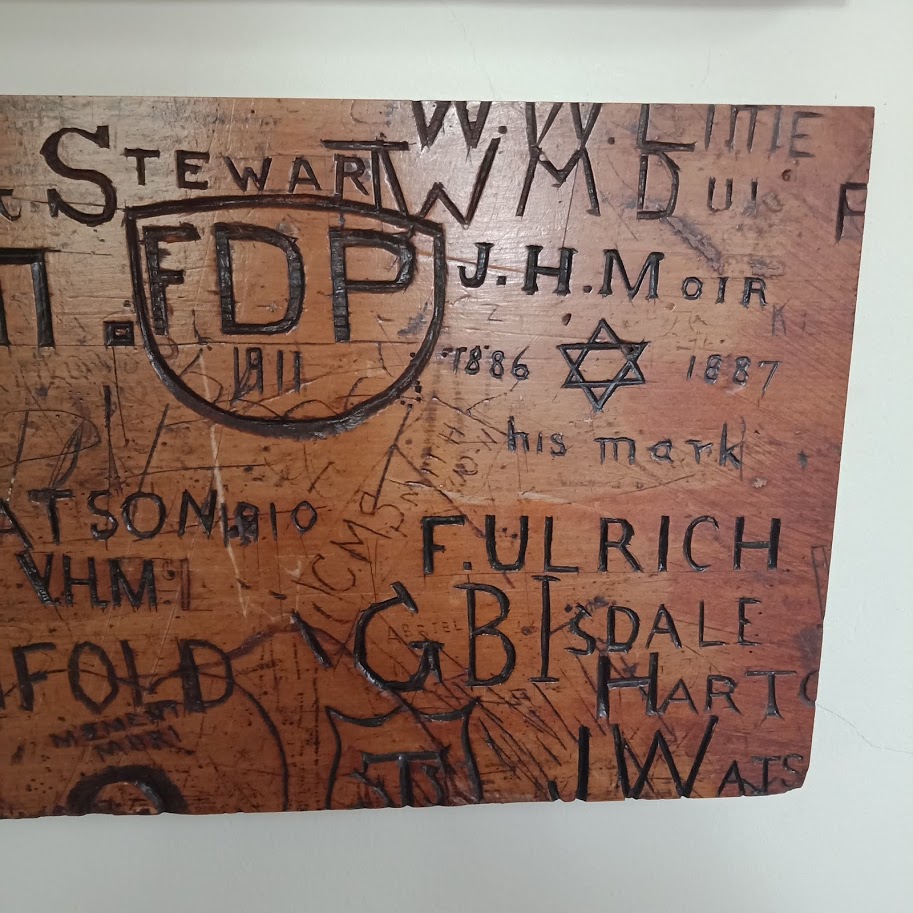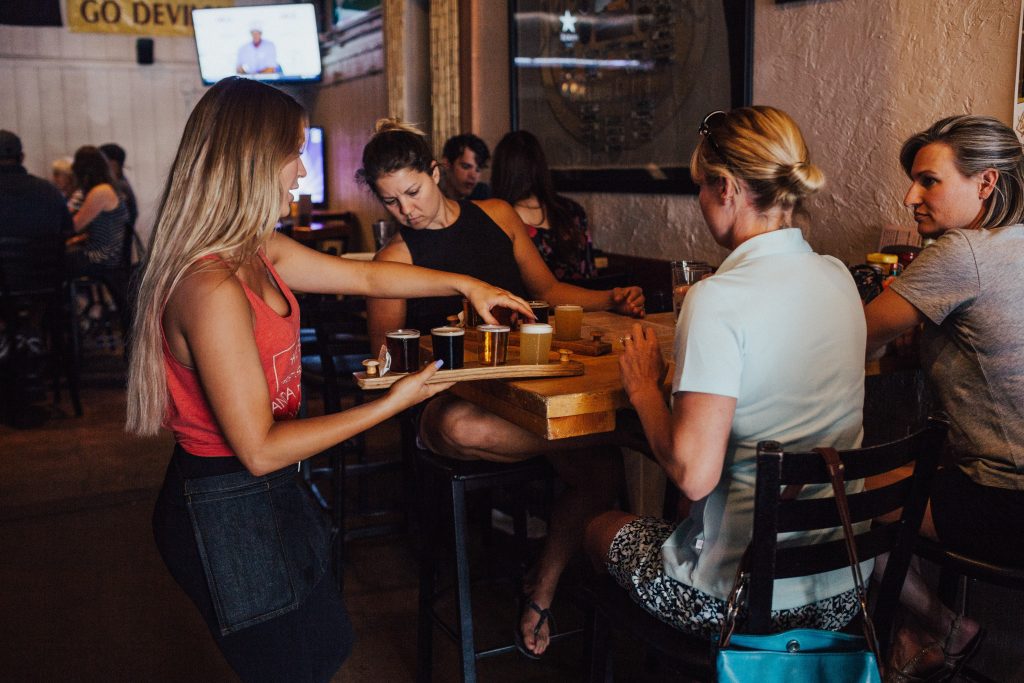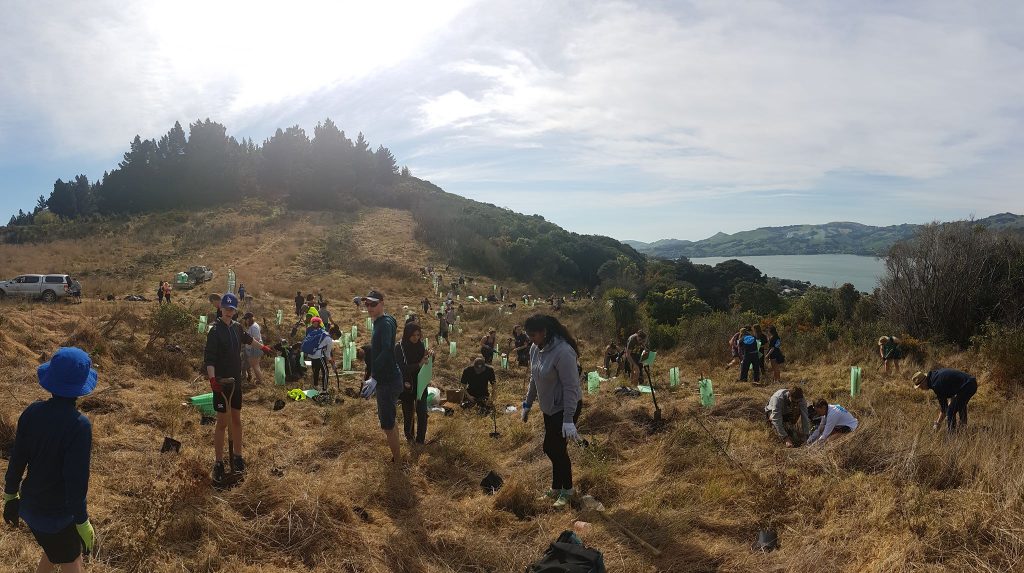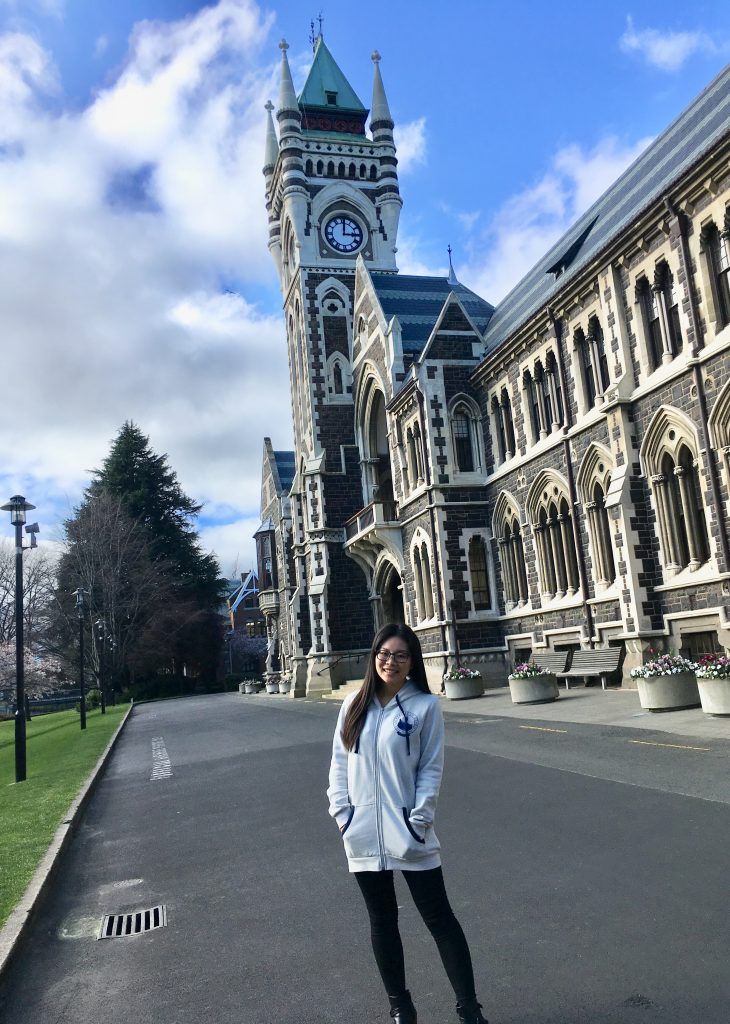Career Success – what does it mean to you?
When you make the decision to study towards a degree or diploma you are setting yourself a goal to strive towards – but what happens when you reach that goal? You have your qualification, so what next? How do you shape your career into what you want it to be?
We caught up with Yvonne Gaut from the University of Otago Career Development Centre to discuss this and she has put forward two simple and wise tips that can help you get where you want to go.
Choice
“When we make choices about our careers, we are making choices that will have implications for our work, our learning, our families and our communities”.
Tristram is one of my favourite career professors and I follow his work as he publishes and presents around the world. He investigates how various aspects of your identity, position in society and background will impact on your chance of career success.
Goal = Success
This is a good time to pause and consider what career success means to you. If you don’t know what that is, then you won’t know if you can achieve it. Once you have an idea of career success this can then be a goal. When you have a goal you are able to develop a strategy to work toward.
Take time to dream
#Tip 1. Take some time to dream, talk or draw about what career success will look like to you. It’s a useful idea to have a career journal either a paper one or within a device. Someplace that you can keep a record of your reflections and can return to whenever you feel the need.
How your career develops is not just an outcome of your choices, personality or your course. How the society in which you live is structure and how other people treat you, all have an impact.
Identify barriers
#Tip 2. Identify some of your future barriers. Considering what might hold you back from achieving your goals enables you to work on them before they leave you powerless.
Careers development works at the interface between the individual and society, between self and opportunity, as well between aspiration and realism.
Ask for help
Make use of the career service while it is freely available to you. If you are not sure what you need to ask, talking with a career development adviser can help to clarify your thoughts around your career and provide some ways to consider your future goals.
You can make a time to talk with a career development adviser through OtagoCareerHub or directly contact yvonne.gaut@otago.ac.nz
Career Development Centre – Te Pokapū Umanga | University of Otago – Te Whare Wananga o Otago
IS Building, Albany Street, PO Box 56, DUNEDIN
5 things you might not know about the University of Otago….
As we rapidly approach 2019 and the University of Otago’s 150th birthday celebrations, it seems like a good opportunity to delve into the archives to find out some not so commonly known pieces of information about the university. I have asked around and here are 5 hidden gems that you might not know about the University of Otago.
Gargoyles or Grotesques?
Perched high above the Archway (which was once the formal entrance to the University) are a series of grotesques, each representing the various branches of learning available at the university at the time. They have been named gargoyles but the distinction lies between the fact that a gargoyle functions as a water spout to divert rain from the buildings, whereas a grotesque is purely decorative and involves either fanciful animal and human forms often distorted to be ugly and absurd.
Rumour has it that the grotesques were modelled on academic staff of the time……but that has never been confirmed. The man responsible for these unique little design elements was Edmund Anscombe (1874-1948), the university’s architect from around 1909 to 1929. While Fletcher Brothers won the tender to construct the Archway with a price of £10,292, the stonemason who carved the grotesques is unknown.
Otago’s oldest building
When you look at our gorgeous campus it is easy to assume that the oldest buildings are the old stone buildings in the centre of campus, but as the university expanded over time it began to acquire neighbouring properties which ranged from tiny cottages to larger homes.
Some were demolished, but some still survive, including what is widely deemed to hold the title of ‘oldest building on campus.’ Mellor House, one of the old Union Street houses which is now home to the Department of Psychology was originally built in 1862 for Thomas Calcutt, a printer who migrated from England to Otago in 1858.
Cry me a river……of tears
These beautiful black gates were originally the main entrance to the campus, as the entire campus was once contained within the ‘Quad’ which you can see immediately beyond the archway.
This stone corridor houses display boxes on the left which now contain information about events around the university, but their original purpose was for the public display of exam results. Hundreds would gather to view their results and many a tear was shed when the marks were not positive, hence the archway being coined ‘The Corridor of Tears’ or the ‘Tunnel of Tears.’
The archway links the Allen Hall building (completed 1914, it was originally the Students’ Union) to the former School of Mines building (completed 1909, which is currently home to the International Office and where I am writing this blog). The entire group of buildings was designed by Edmund Anscombe the architect for the majority of the University buildings from 1909 to 1927.
The original site of the Dunedin Botanic Gardens
The Water of Leith which runs through the university campus is not always this tranquil, and this was certainly the case when in February 1868 floods washed away bridges, and about an acre of gardens – at this point in history this site was home to the Dunedin Botanic Garden. This saw the Botanic Garden moved further north to their current site, and the university was able to purchase the land and develop it in the 1870’s. Some of the trees in front of the clocktower are indeed older than the buildings themselves as they are a reminder of the original inhabitants of this site.
Students have always pushed the boundaries
Each generation that passes seems to muse on the fact that the younger generations are less respectful, more verbal and opinionated and more willing to push the boundaries, but it appears that students, or indeed the younger generation have always held this inclination.
The image above was taken from the desktops of the oldest lecture theatres on campus – in both Geology and the clocktower. As you can see from the dates, some of this is very old indeed, with J.H. (John Harpur) Moir making his mark in 1886-1887. Mr Harpur graduated with a B.A in 1890 and became headmaster of Dunedin’s Normal School.
The full installation, complete with plaque now features on the south wall of the council chambers in the clocktower building, and it really is a remarkable and historical sight to see, some of the graffiti is embedded so deeply into the wood, it must have taken hours!
Nicky Richardson is an International Marketing Coordinator at the University of Otago. With degrees in music and marketing, she is a recent graduate of Otago herself – she loves Otago so much she ended up getting a job here!
Employability is the new ‘it’ word, what does it really mean?
There is so much jargon in the business world…….buzz words, acronyms that seem to be more confusing to people than helpful half the time… and confusion over what a word or phrase actually means………but we are not afraid to ask the questions here!
We decided to talk to Melissa Fuller about the word ’employability’ – here is her take on this fashionable word.
Soft skills
Employability is the new ‘it’ word, but in simple terms for a candidate looking for a role – it is your soft skills.
So what are soft skills? They are skills outside of your qualification. Skills such as the ability to form relationships, create a customer experience, effectively communicate with others and problem solving. These skills are hard to teach and some people naturally have them.
No prior work experience is irrelevant
The best way to gain those important soft skills is to volunteer, find part time work or summer work. No prior work experience is irrelevant. In any work experience you have developed skills such as listening, following instructions and communicating with a diverse range of people.
Soft skills = transferable skills
These skills are transferable into any role you wish. An example: if you work in a busy restaurant while studying finance, you are able to show your ability to work and listen under pressure. Something that may be important in a finance based role. You can identify what skills outside of your qualification are important by reading the job description or talking to others in the industry.
Sell your particular package of skills
It is important to remember that Dunedin, as well as New Zealand, is built on small to medium size businesses with employee numbers fewer than 30. Investing in employees is a big decision for those employers and an expensive undertaking. ‘Selling you‘ as a package of skills to a potential employer will enhance your chances of becoming employed and help the business.
Learn, grow and develop yourself
Look outside your qualification and create opportunities to learn new skills. Unicrew is a great place to go to try out volunteering. For more information on how to find work while studying in Dunedin, follow us on Facebook. www.facebook.com/getworkready or go to www.getworkready.co.nz for more information.
Melissa Fuller is the energetic, enthusiastic program co-ordinator at ‘Work Ready,’ and she is passionate about helping international students adapt to life in New Zealand and move into employment prior to graduation.
Where are they now? 5 questions and answers with an Otago alumni.
There is no shortage of information on what universities can offer prospective international students in regards to programme choice, entrance requirements, accommodation and lifestyle, but once you have reached your goal and walked the stage to receive your hard earned degree or diploma, what next? Life doesn’t end when your course ends, it is just the beginning! We decided to catch up with University of Otago alumni Joyce Zhang to find out where she is, what she is doing, and her thoughts on what it is like to be an international student studying at Otago.
What did you study and why?
I studied English at the University of Otago Language Centre and Foundation Year UOLCFY and then studied telecommunication (Postgraduate Diploma in Science) in information science department which is on the ninth, tenth and eleventh floors of the Otago Business School building. It was the same major as my Bachelor degree, everyone in my bachelor class in China pursued a higher degree as we believe it will lead to better employability. I thought ‘why not improve my English along with a higher qualification’ so I decided to go overseas.
Where are you now?
I am working as a China Representative for the University of Otago and I am based in Guangzhou, China. I look after student recruitment and partnership engagement in the China market for the Otago University International Office (which I am very proud of – it is a dream for me to work for my university 😊).
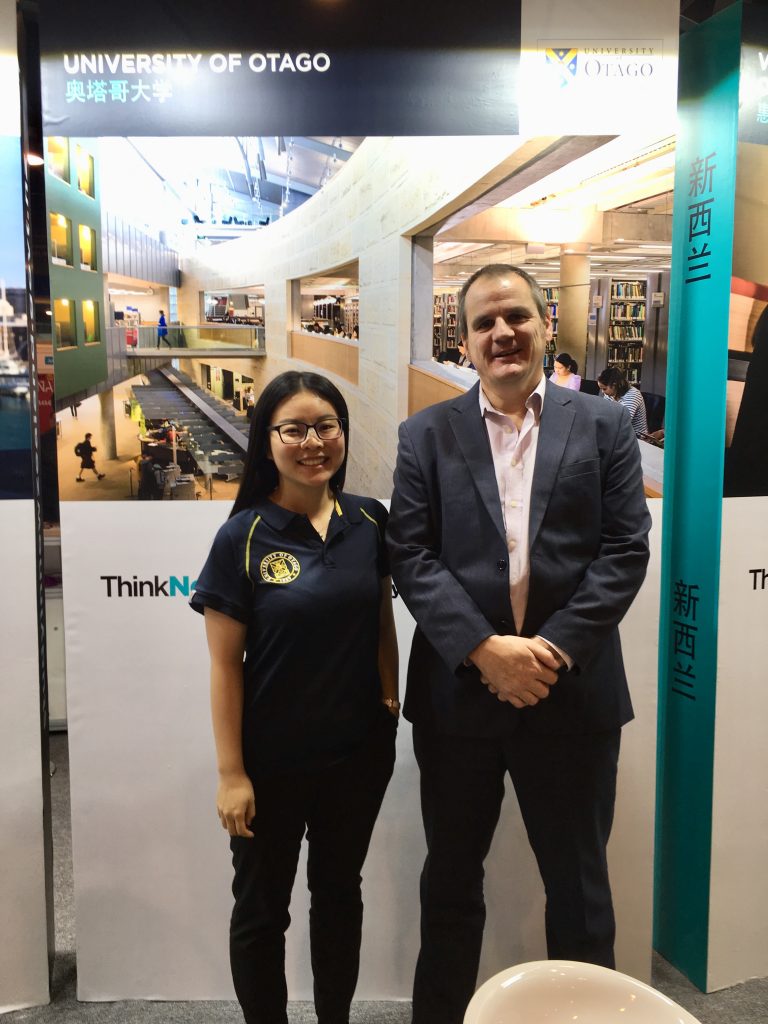
Joyce Zhang pictured here with Regional Marketing Manager for China, Dan Prain at an Education NZ Fair in Beijing, China last month.
Fondest memory of Otago
My fondest memory of Otago was my international friendships – you never lose them even though you’re not in the same country. A Japanese girl I met in Language Centre helped me a lot to improve my oral English so I achieved IELTS 7 in speaking after only 1 month of my arrival in NZ. A Korean girl with a working holiday visa invited me to visit her in Seoul two years ago, and we went to Shanghai Disneyland this March. I also met a nice couple from Denmark who studied as exchange students and we visited the Dunedin Chinese Garden and went skiing together. I am so proud of all these friendships and value them as treasures in my life… I know that I will never forget them and that they will never forget me and we keep in touch on social media.
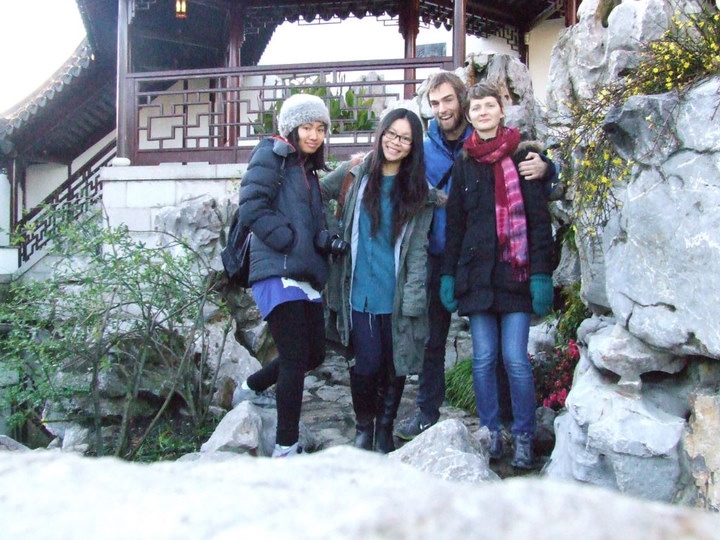
Joyce Zhang (pictured second from the left) at the Dunedin Chinese Garden with other postgraduate students she met and made friendships with whilst studying at Otago.
What advice would you provide for incoming international students about Otago?
Make friends and experience as much as you can. You might worry about your English, safety about travelling and all sorts of stuff, but please don’t stop exploring. Join in peer programmes, language exchange programmes, mentee and mentor programmes. There are many kinds of useful programmes designed for international students that will give you real engagement and help you become a true Otago student.
And just because we like to keep things a little bit light hearted, we thought we would throw in a random question…….
If you were on a deserted island and could only bring three things, what would you bring and why?
Hmmm water, food and… a boyfriend??!! Even if I was isolated, I can still be alive and enjoy every min as long as I can! 😊
If you want to maximise your employment opportunities with further study, want to improve your English speaking and make life long friendships, be like Joyce and find out more about studying at Otago!
Nicky Richardson is an International Marketing Coordinator at the University of Otago. With degrees in music and marketing, she is a recent graduate of Otago herself – she loves Otago so much she ended up getting a job here!
NZ teachers lead the world – Otago teachers lead NZ!
New Zealand was ranked number one in the world for educating students for the future, according to a report by the Economist Intelligence Unit (EIU) released late last year.
Here at Otago for the sixth time in seven years, we have the top tertiary teacher in New Zealand! I’m sure we have all had teachers that we look back on and groan….but then there are those that inspired us, encouraged us and helped us become the best we could be….and we just happen to have that teacher (amongst many others passionate about their craft) here at Otago.
So who is this stand out teacher? And what are her thoughts on Otago? Faumuina Associate Professor Fa’afetai Sopoaga took time out from her busy schedule to have a chat to us about her journey……
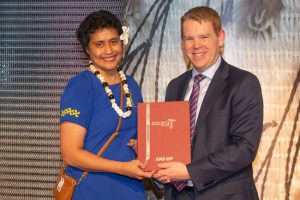
Faumuina Associate Professor Fa’afetai Sopoaga receives New Zealand’s top tertiary teaching award from the Minister of Education, Hon Chris Hipkins, at a ceremony at Parliament. Photos: Ako Aotearoa.
From a little girl growing up in a small island in Samoa, to winning the Prime Minister’s Supreme Award at the National Tertiary Teaching Excellence Awards, Faumuina has certainly come a long way.
“I came to New Zealand in the 1980’s – fresh off the boat – to train in Medicine at the University of Otago.”
Faumuina also received an Endorsement for Excellence in Supporting Pacific Learners, a reflection of her ongoing commitment to pastoral care and curriculum development of Pacific students. She is “delighted” that Pacific Health is being recognised as important in the training of future health professionals.
 “As an international student, coming from a small island in the Pacific (Samoa), the University could have been overwhelming. I thrived in the environment, met wonderful friends from many areas in the world including Asia, Europe, Africa, the Americas and of course Kiwis.”
“As an international student, coming from a small island in the Pacific (Samoa), the University could have been overwhelming. I thrived in the environment, met wonderful friends from many areas in the world including Asia, Europe, Africa, the Americas and of course Kiwis.”
Faumuina’s experience studying at Otago saw her face some major personal challenges, but ” through the excellent and supportive environment, I graduated despite developing a chronic illness (Lupus) while in training.”
Faumuina chooses to call Dunedin and NZ home now – “Dunedin is truly an international university city, its people are proud of this, and embrace all students from different ethnic backgrounds.”
But it is her experience studying and now teaching at the University that Faumuina and her husband (a first generation Canadian with Italian parents), choose to stay here…
“The University of Otago’s motto is ‘Dare to be Wise’ – students are offered every opportunity to excel here.”
Discover more about how Otago and New Zealand teachers could change your future.
Nicky Richardson is an International Marketing Coordinator at the University of Otago. With degrees in music and marketing, she is a recent graduate of Otago herself – she loves Otago so much she ended up getting a job here!





